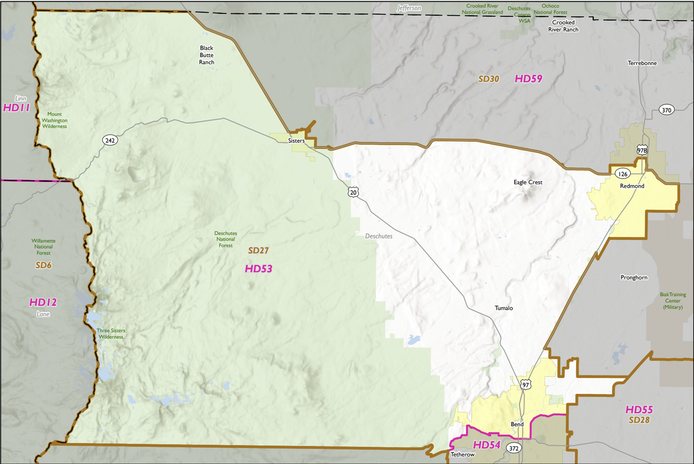Serving Everyone when Everyone Disagrees with Everyone about Everything
|
1/2/2022
The job of properly motivated politicians is to serve their constituents. All of them. As I campaign for Oregon State Representative from House District 53, I’ve been pondering the question of how to serve everyone. Since I’m campaigning for a state office, the job requires serving not only everyone in HD 53, but also everyone in Central Oregon and everyone in Oregon. |
Everyone can be well served, regardless of differences, if we remain rightly motivated to seek the highest and best outcomes for the people of our region and state. Nobody said it would be easy. But it is worth it. |
That would be a daunting task if everyone agreed on everything, but since it seems like we’re in a season where everyone pretty much disagrees with everyone else on just about everything, the job appears even more challenging. But then, I’ve never known anyone who agreed with me entirely (that would be scary). I’m certain you will not agree with me on everything, and that’s OK. Come to think of it, I’ve never known anyone who I agreed with entirely on everything, either. So perhaps, even though this season may be more emotionally charged than others, the issue of how to serve everyone when everyone disagrees with me, and also disagrees with everyone else, is actually a normal state of affairs.
This dilemma has certainly characterized my 30-year career in mergers and acquisitions (M&A). My job has been to represent clients and negotiate deals to successful closure when everyone involved and affected by the transaction has a different, sometimes wildly different agenda from everyone else. So here are ten lessons from a career in deal making that I’m confident will help in the world of politics.
This dilemma has certainly characterized my 30-year career in mergers and acquisitions (M&A). My job has been to represent clients and negotiate deals to successful closure when everyone involved and affected by the transaction has a different, sometimes wildly different agenda from everyone else. So here are ten lessons from a career in deal making that I’m confident will help in the world of politics.
- Remember who the “boss” is. As a deal maker, my boss has always been my client, to whom I owe a fiduciary responsibility…that’s the highest standard of care. As a State Rep, I expect it to be the same. The people of Oregon, and specifically the people of Central Oregon will be my boss. It seems politicians forget this. We’ve seen that in Oregon over the last couple of years.
- Remember to listen. An M&A advisor must consider a lot of voices. A State Representative, even more so. However, clients can only be well served if their voices are heard. In Oregon, it’s safe to say that the voices of the rural residents are often drowned out by the voices of urban dwellers.
- Remember what the role is. The role of an M&A advisor is to be an agent, not a principal, and to solve transactional problems for the principal. The legislator’s role is not to rule. It’s to negotiate and design the laws of the state in collaboration with others, none of whom agree with each other on everything. The role of a State Rep is to solve legislative problems for the benefit of constituents. One of the legislative problems that needs solving in Oregon is curbing the radical overreach of the Governor and the abuse of executive powers we’ve seen over the last couple of years.
- Remember First Principles. Interestingly, First Principles are the same for an M&A advisor as they are for a legislator. First Principles are found in the Bible, in the US and State Constitutions, as amended, and, to a lesser degree, in Federal and State laws. Whenever a contemplated “solution” diverges from First Principles, it’s time to contemplate again.
- Remember the Customer is not always right. While this might seem inconsistent with point one above, it’s been my experience that clients hire agents, and constituents vote for representatives, not because the client or voter always knows the right answer, but because they want someone to work for them to find the highest and best solutions, regardless of whether those solutions initially seem “right” to the client. In politics, the loudest voices are not always right. They are just loud. That does not mean their voices do not matter, it just means they may be advocating only for themselves, with little regard for others, ignoring First Principles, or without concern for the bigger picture.
- Remember to seek the highest and best outcome for all concerned. Expediency is the enemy of excellence. Here’s where the Rotary Four Way Test in evaluating a course of action proves useful: “Is it the truth? Is it fair for all concerned? Will it build goodwill and friendship? Is it beneficial to all concerned?” Although most politicians are not Rotarians, if the Four Way Test had been applied to decision making over the last two years, our country and state would be in much better shape.
- Remember there is always an alternative. Bad deals and bad policy are made when people perceive they have no alternatives. The job of an intermediary and the job of a representative is to explore alternatives and find a path to the highest and best outcome.
- Remember that disagreement does not mean disrespect. We can disagree without being dismissive, disrespectful and disagreeable. We can disagree without disunity. Disagreement is healthy. Debate is good. Rigorous negotiation always produces better outcomes than one-sided approaches. One of the biggest political problems in Oregon is the Democrat super-majority in all branches of government. The problem would be similar if it was a Republican super-majority. No single person or party has all the right answers. Super majorities stifle productive debate and deliberation and result in sub-optimal decisions. We need to rebalance perspectives at the state level for the benefit of all.
- Remember people before policies. People must come first before deal points, policies, rules and bureaucracy, in order that, as Abraham Lincoln urged, government will be of the people, by the people, and for the people.
- Remember who benefits or suffers. Businesses and business deals leave a legacy. So do political decisions. The ones who will ultimately benefit or suffer from our political decisions are our kids and grandkids. Our votes may be blessings or curses long past our lifetimes. It’s a sobering thought.
Everyone can be well served, regardless of differences, if we remain rightly motivated to seek the highest and best outcomes for the people of our region and state. Nobody said it would be easy. But it is worth it.



